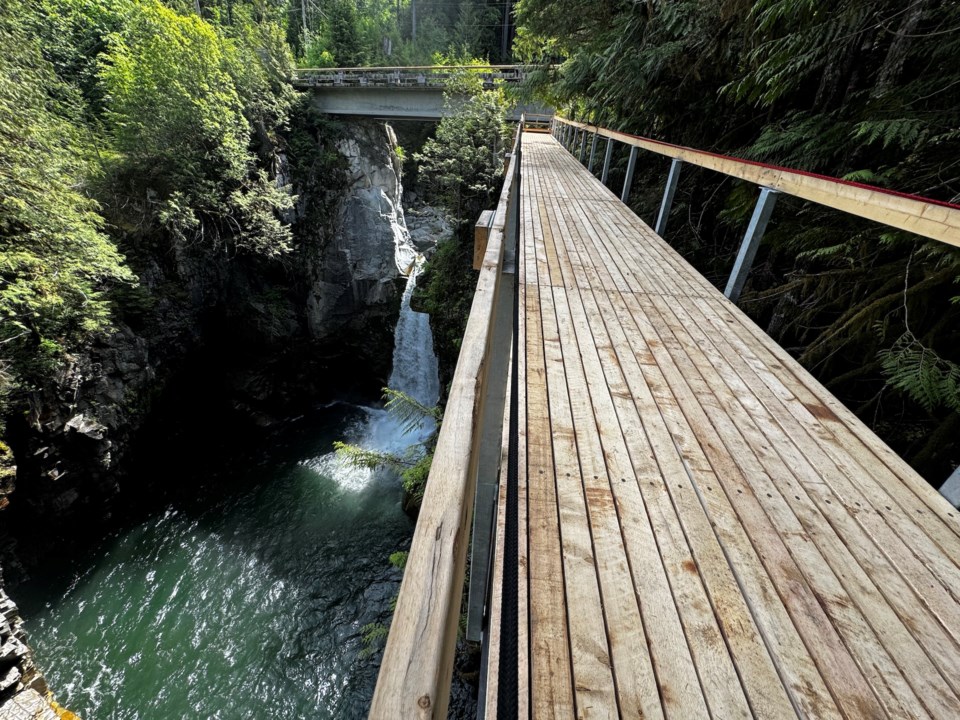Robin Sherry is standing on a stretch of elevated yellow cedar boardwalk just off of Powerhouse Springs Road.
The sun is streaming through the skinny, second-growth trees and it’s not hard to picture how his long-time vision for the Squamish Canyon will look when it’s completed in late spring 2025.
Just minutes earlier, hikers were wandering around searching for the nearby trailhead to Mamquam Falls—a short hike that’s gone from a locals’ secret to social media famous in the last couple of years.
His crew has been onsite all season building the 1.3 kilometres of boardwalk that will snake through the forest under the Mamquam Falls bridge, along the picturesque canyon and end at a “forest lounge,” with a children’s play area, a concession stand, education area, and small artisan booth.
The goal, he says, is to offer Squamish a year-round attraction that is accessible to nearly everyone, concentrating tourism in one area and educating those tourists about the land.
“[The popularity of the falls] reaffirms that it’s a good idea what we’re doing. It reaffirms it’s needed for the community. It reaffirms Squamish has changed. You can look at that in a positive way or a negative way. There’s good and bad that comes with everything. It’s how you plan for it and how you put in place things to absorb that and make those experiences and interactions good for the community and visitors,” he says.
(It should be noted that the regular hiking route to the falls will remain open and free to the public. Kayak access, likewise, will remain.)
The project saw some push back from community members—namely those who wanted to see the area untouched and wild. But with approvals in place and construction nearing the halfway point, Sherry says he’s looking forward to the attraction’s opening next year, a decade after he first conceived of the idea.
“We’re not quite 50% complete, but we certainly have overcome our biggest risks, which is the foundational risk when you’re working along a forest and a cliff wall—what the rock is actually going to entail. You can only do so much surfacing, digging, inspecting until you get into it,” he says.
FortisBC and Canyon interface
As Sherry’s tour approaches the concrete bridge located above the power project generating station near the falls he pauses. Currently, access to the road that crosses the bridge has been very limited, something he said they built their plans around.
But FortisBC is waiting to find out if District of Squamish council will grant a temporary use permit (TUP) for the company to build a workers’ accommodation lodge in the area, for construction of the Eagle Mountain - Woodfibre Gas Pipeline Project, which could mean many vehicles crossing that bridge on a daily basis.
“Understand everything that we were asked to design around for the last 10 years was a road that was gated off that accesses our aquifers. We invested time and money and energy understanding that to be the case,” Sherry says.
For its part, FortisBC said in a written statement that it “understands the importance of reducing impacts to local businesses.”
“We have engaged Squamish Canyon over the past number of years and have committed to several mitigation measures to reduce project construction impacts on them, should we receive approval from the District of Squamish to construct and operate the temporary workforce lodge,” it continues.
It lists: providing dust control and maintenance of the Mamquam River Forest Service Road and Powerhouse Springs Road (which would be Squamish Canyon’s job); reducing traffic over the bridge by changing their approach and using the Valleycliffe Construction Laydown Yard for personal vehicle parking and the temporary workforce lodge as overflow; shuttles to reduce traffic; upgrading the Mamquam River FSR from Highway 99 to the Powerhouse Springs Road intersection; and collaborating on field signage and opportunities to promote Squamish Canyon when it’s operational.
“We believe these measures will not only reduce impacts to Squamish Canyon during the construction and operation of the temporary workforce lodge, but may also provide longer-term benefit to Squamish Canyon,” it concludes.
Sherry maintains those measures aren’t enough.
“While Fortis has made some necessary updates to the [Mamquam FSR] to improve safety for all users, this does not offset the significant financial losses caused by operating a 600-man work camp, serviced by trucks, personal vehicles, and shuttle buses, running through a nature-based tourism experience, especially during its critical start-up year,” said Sherry in a follow-up email.
But whether or not the lodge TUP is approved, Squamish Canyon continues to move closer to its opening day.
“What we’re excited about is that this is a long-term sustainable business that is infrastructure that is needed,” Sherry says. “It’s an amazing investment in the entire corridor that will be sustainable economics and tourism for generations, not for a short period of time. And temporary things should not be interrupting things that allow benefits for generations.”




